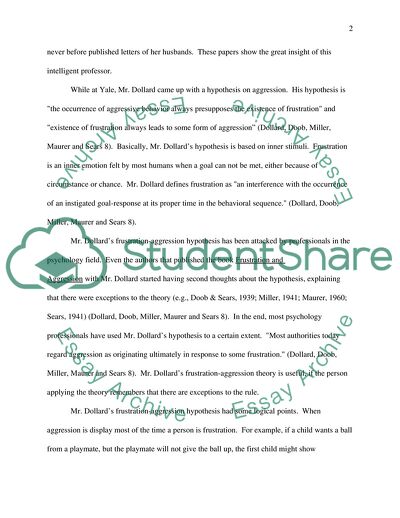
- Home
- Free Samples
- Premium Essays
- Editing Services
- Extra Tools
- Essay Writing Help
- About Us
- Studentshare
- Subjects
- Miscellaneous
- Theorist on John Dollard or Albert Bandura
Theorist on John Dollard or Albert Bandura - Essay Example

- Subject: Miscellaneous
- Type: Essay
- Level: Undergraduate
- Pages: 4 (1000 words)
- Downloads: 0
- Author: alvahtowne
Extract of sample "Theorist on John Dollard or Albert Bandura"
After graduating the Yale University’s Institute of Human Relations selected Mr. Dollard to be a research associate in psychology in 1932 (“John Dollard”). While Mr. Dollard was a research associate he met another Yale psychologist, Neal Miller. Most of Mr. Dollard’s work at Yale would be with Mr. Miller. Besides Mr. Dollard’s work with the frustration-aggression hypothesis, he also wrote and researched race relations in the United States. His research took place long before the Civil Rights Movement. Mr. Dollard was interested in cultural differences.
His book Caste and Class in a Southern Town took an anthropological look at race in a small Mississippi town (Dollard, 1957). In 1952, Mr. Dollard became a professor in Yale’s Department of Psychology. Mr. Dollard published many books over the years he was at Yale. Although a professor, Mr. Dollard never lost his fascination with human behavior. He remained until retiring with the title of professor emeritus (“John Dollard”). When Mr. Dollard died in 1980, the psychology field lost a brilliant professor and researcher.
A decade after his death, John Dollard’s widow donated many never before published letters of her husbands. These papers show the great insight of this intelligent professor. While at Yale, Mr. Dollard came up with a hypothesis on aggression. His hypothesis is "the occurrence of aggressive behavior always presupposes the existence of frustration" and "existence of frustration always leads to some form of aggression” (Dollard, Doob, Miller, Maurer and Sears 8). Basically, Mr. Dollard’s hypothesis is based on inner stimuli.
Frustration is an inner emotion felt by most humans when a goal can not be met, either because of circumstance or chance. Mr. Dollard defines frustration as "an interference with the occurrence of an instigated goal-response at its proper time in the
...Download file to see next pages Read More
- TERMS & CONDITIONS
- PRIVACY POLICY
- COOKIES POLICY